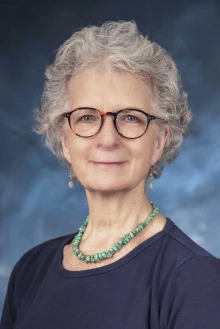Hildebrand receives Rosalind Franklin Society award
Celia Hildebrand, DAOM, a research assistant professor of family and community medicine at the University of Arizona College of Medicine – Tucson, was among the recipients of the third annual Rosalind Franklin Society Awards in Science.

Celia Hildebrand, DAOM
The award recognizes the best paper by a woman or underrepresented minority in science in each of the Mary Ann Liebert Inc. journals in health, medicine and biotechnology. Hildebrand was selected for her 2023 article “Auricular Acupuncture in Combat Medic Trainings” in the journal Medical Acupuncture. Auricular acupuncture is also referred to as ear acupuncture.
“Receiving this award is quite an honor,” said Hildebrand.
She said there is great value in acupuncture as an effective modality for trauma-informed care. Her article describes the process of establishing a structure to create, build and demonstrate the use of East Asian medicine to treat physical and emotional trauma in a country at war – in this case, Ukraine. As a result of Hildebrand’s work, there are now 130 medical providers in 14 cities and towns in Ukraine performing the simple auricular acupuncture protocols she taught.
“The work I do in Ukraine is due in large part to my ancestral connections to the people and the land,” she said. “It is also built upon more than 20 years of experience using simple, evidence-based practices that employ neurological connections to alter physiological responses to stress and trauma.”
Hildebrand began studying East Asian medicine after a bicycling accident in 1983 crushed several of her vertebrae.
“My experiences were made more profound because Western medicine had little to offer in explaining what my nervous system and emotional bodies were experiencing as my physical body was trying to recover from the impact of the accident,” she said. “I wanted to understand more about healing from the inside out. At the time, Western medicine was unable to give me the language or the pathway to explore my deeper process of healing from that trauma.”
Hildebrand holds an appointment at the Andrew Weil Center for Integrative Medicine, where she rewrote the East Asian medicine curriculum, lectures during residency weeks and teaches a one-day program on the use of two of the three auricular acupuncture protocols she taught in Ukraine. She is also a contributing faculty member in the Human Rights Practice program at the College of Social and Behavioral Sciences.
“Being recognized for work in East Asian medicine is an honor, as was receiving a Fulbright that launched all of this by building a curriculum to teach East Asian medicine within the College of Medicine at Uzhhorod National University and later, in Tucson,” Hildebrand said. “Mostly, what I take to heart are the relationships built as a result of these honors. These are commitments built on hope, radical trust and the demonstration of grit, determination and achievement. I am so proud to be among the community of warriors who show up every day to bring the best healing we have to offer.”
In addition to East Asian medicine, Hildebrand also supports Native American health initiatives. When she first joined the Department of Family and Community Medicine in 2021, she worked on a project with Francine C. Gachupin, PhD, MPH, a professor in the same department.
“We collaborated on a contractual partnership with a local tribal organization for public health surveillance and health service delivery assessments,” said Gachupin. “These efforts led to foundational support for the opening of a local outpatient health care service delivery system for American Indians in the Tucson area. Dr. Hildebrand is deeply committed to addressing American Indian health disparities and has spent her career assisting tribes to build and sustain programs, policies and systems.”

